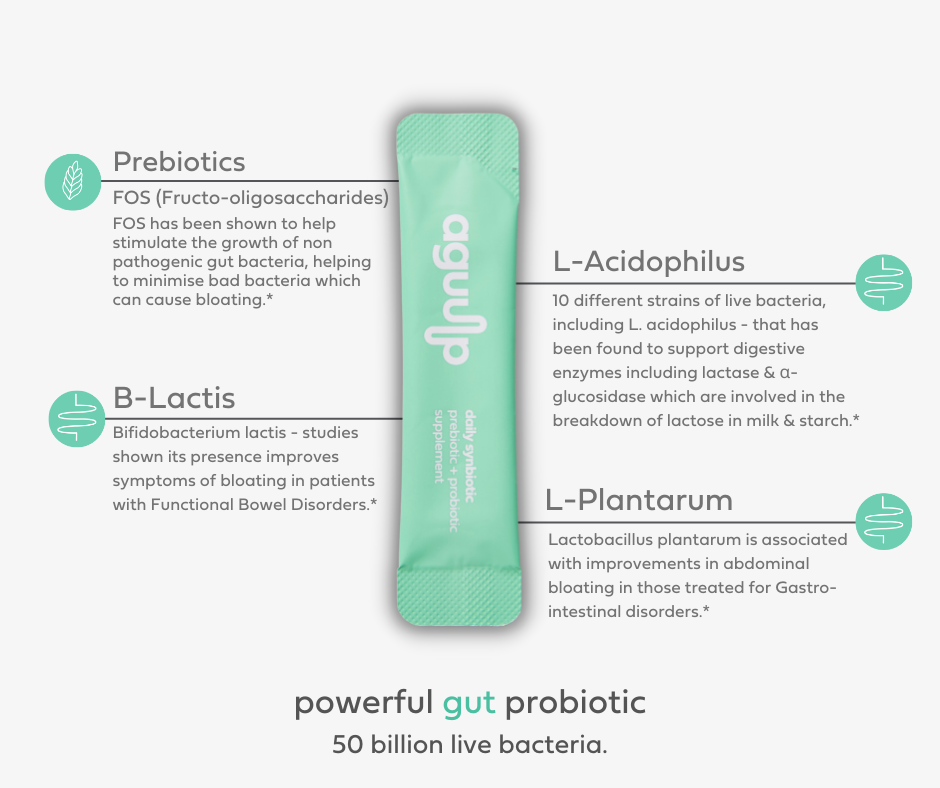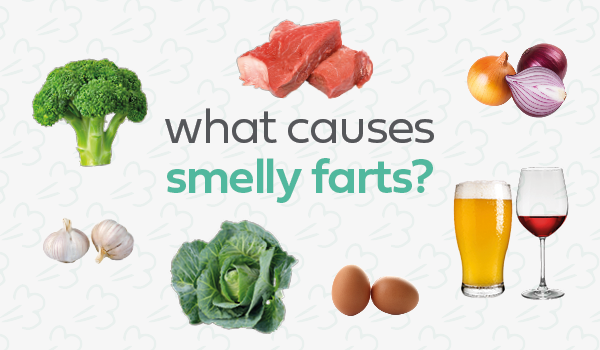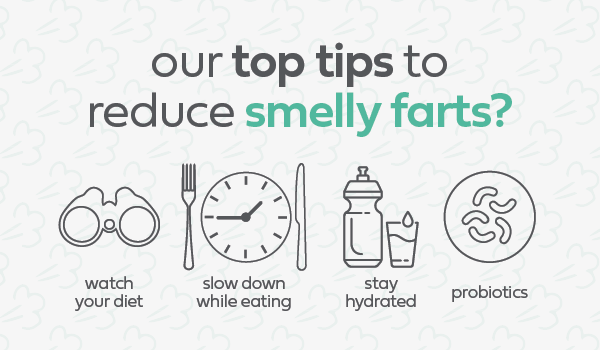What Causes Smelly Farts? Everything You Always Wanted To Know

We’ve heard many questions and curiosities about our digestive processes. Today, we are exploring a topic that might raise a few eyebrows but is actually quite common: what causes smelly farts? We all experience flatulence from time to time, but have you ever wondered why some farts have a more pungent odour than others, or to put it bluntly, why does farting smell so rank? Let’s take a deep dive (with noses firmly held, thank you very much) into the fascinating world of intestinal gas and uncover what causes those not-so-pleasant smells.
Flatulence, commonly known as farting, is a natural process that occurs in the digestive system. It happens when excess gas builds up in the gastrointestinal tract and is released through the rectum.
When we eat or drink, we also swallow air, which contributes to the gas in our digestive system. Additionally, the breakdown of certain foods during digestion produces gases such as nitrogen, carbon dioxide, hydrogen, and methane. These gases are byproducts of the fermentation and bacterial activity that occur in the intestines.
It’s important to note that passing gas is a normal bodily function and helps relieve discomfort caused by the build-up of gas. However, excessive flatulence or quite strong smelling farts may be a sign of an underlying digestive issue.
So, why does farting smell so bad sometimes? It all comes down to the composition of the gas and the specific foods we eat. Certain foods contain sulphur compounds, like those found in:
- Cruciferous vegetables: broccoli, cabbage, and cauliflower
- Onions
- Garlic
- High-protein foods like meat and eggs
- Beverages such as wine and beer
When these foods are broken down by bacteria in our gut, they release smelly sulphur gases, resulting in farts that can clear a room.
But it’s not just the food we eat; the balance of our gut microbiome also plays a role in what causes smelly farts.
Our gut is home to trillions of bacteria that aid in digestion. When there’s an overgrowth of certain bacteria or an imbalance in the gut microbiome, it can lead to increased gas production and, consequently, more odoriferous farts.
Now, while we can’t completely eliminate the smell of our farts (after all, they’re a natural bodily function), we can take a few steps to minimise the odour.
Knowing what causes smelly farts can help you be more mindful of what to avoid eating and lifestyle habits you might want to change. For example:
Watch your diet: Pay attention to the foods that tend to make your farts smell worse. Limiting your intake of sulphur-rich foods and processed foods can help reduce the intensity of the odour. Eating a varied diet to encourage a more diverse gut microbiome too can reduce the bad bacteria that can cause foul smelling gas.
Stay hydrated: Drinking an adequate amount of water aids in digestion and can prevent constipation, which can lead to more odorous gas.
Probiotics: Probiotics, often found in fermented foods or available as supplements, can promote a healthy gut microbiome. By improving the balance of bacteria in your gut, probiotics may help reduce gas production and improve overall digestive health.
Slow down while eating: Eating too quickly can cause you to swallow more air, leading to excess gas. Take your time and chew your food thoroughly to minimise the amount of air you swallow.
It’s important to remember, however, that occasional smelly farts are a normal part of life, and everyone experiences them. If you notice significant changes in your bowel habits, persistent abdominal discomfort, or other concerning symptoms, it’s always a good idea to consult with a healthcare professional to rule out any underlying medical conditions.
How can aguulp help with smelly farts?
When it comes to supporting gut health and managing issues like smelly farts, aguulp offers a range of products designed to promote a healthy gut microbiome and digestive function, alongside dietary and lifestyle modifications.
One of our popular products is our aguulp Gut Probiotic supplement. This is a synergistic supplement that combines both prebiotics and probiotics in high amounts. Prebiotics serve as food for the beneficial bacteria in your gut, while probiotics are live bacteria that help maintain a healthy balance of the gut microbiome.
By replenishing and supporting the growth of beneficial bacteria, our Gut Probiotic can help improve gut function and reduce symptoms such as smelly farts.

Remember: everybody farts. Yes, everyone
So, embrace the uniqueness of your farts, and don’t be shy about it. They’re a natural bodily function influenced by your diet, gut bacteria, and the intricate workings of your digestive system. And hey, they might even bring some comic relief in your daily life. Just make sure you know what causes smelly farts so you can try to stop them stinking quite so badly…
Get answers to more of your embarrassing gut health questions at aguulp, including what colour should poo be and how often should you poop to stay healthy. Browse our full collection of gut health supplements.
References
- Ford AC, Quigley EM, Lacy BE, Lembo AJ, Saito YA, Schiller LR, Soffer EE, Spiegel BM, Moayyedi P. Efficacy of prebiotics, probiotics, and synbiotics in irritable bowel syndrome and chronic idiopathic constipation: systematic review and meta-analysis. Am J Gastroenterol. 2014 Oct;109(10):1547-61; quiz 1546, 1562. doi: 10.1038/ajg.2014.202. Epub 2014 Jul 29. PMID: 25070051.
- Di Stefano M, Miceli E, Armellini E, Missanelli A, Corazza GR. Probiotics and functional abdominal bloating. J Clin Gastroenterol. 2004;38(6 suppl):S102-S1033.
- Kajander K, Hatakka K, Poussa T, Färkkilä M, Korpela R. A probiotic mixture alleviates symptoms in irritable bowel syndrome patients: a controlled 6-month intervention. Aliment Pharmacol Ther. 2005;22(5):387-394.
- Kim HJ, Vazquez Roque MI, Camilleri M, Stephens D, Burton DD, Baxter K, Thomforde G, Zinsmeister AR. A randomized controlled trial of a probiotic combination VSL# 3 and placebo in irritable bowel syndrome with bloating. Neurogastroenterol Motil. 2005 Oct;17(5):687-96. doi: 10.1111/j.1365-2982.2005.00695.x. PMID: 16185307.
- Nobaek S, Johansson ML, Molin G, Ahrné S, Jeppsson B. Alteration of intestinal microflora is associated with reduction in abdominal bloating and pain in patients with irritable bowel syndrome. Am J Gastroenterol. 2000 May;95(5):1231-8. doi: 10.1111/j.1572-0241.2000.02015.x. PMID: 10811333.
- Kajander K, Hatakka K, Poussa T, Färkkilä M, Korpela R. A probiotic mixture alleviates symptoms in irritable bowel syndrome patients: a controlled 6-month intervention. Aliment Pharmacol Ther. 2005 Sep 1;22(5):387-94. doi: 10.1111/j.1365-2036.2005.02579.x. PMID: 16128676.



